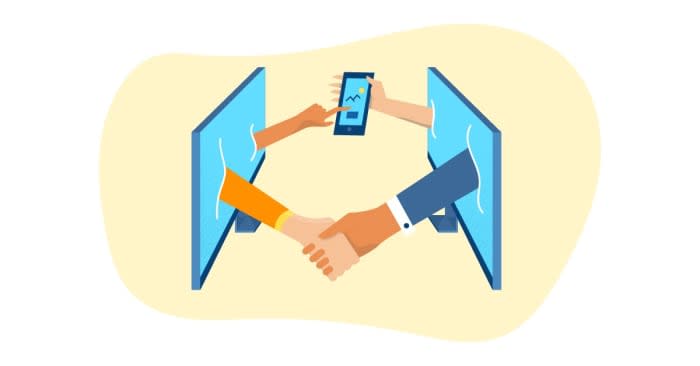Modern construction is increasingly moving towards adopting remote work more permanently in many of its functions. Embracing a more remote workforce is proving to be more cost-efficient and time-effective and generally leads to lower overhead costs. Because of this, project managers are confronted with the challenge of managing their teams in front of a screen as traveling from site to site is now not a non-negotiable.
 Especially with the current pandemic, many industry decision-makers are forced to acknowledge that many construction jobs can be done remotely. It is the most efficient and logical way to mount projects safely. Project managers keen to adopt new practices and construction methods are excelling in this new landscape with remote project management.
Especially with the current pandemic, many industry decision-makers are forced to acknowledge that many construction jobs can be done remotely. It is the most efficient and logical way to mount projects safely. Project managers keen to adopt new practices and construction methods are excelling in this new landscape with remote project management.
Managing projects remotely has its own challenges for you as a construction PM and for your workforce, team members, stakeholders, and clients. To help you face these challenges head-on, here are some tips that can help you make remote work management better for you:
Digitize your toolset
The first thing you have to do is identify which processes you and your team can do remotely with best practices in mind, especially now that new safety regulations are in place due to COVID-19. What processes can you do with minimal person-to-person contact? Can you use drones to survey your site? Is your client amenable to virtual walkthroughs instead of site visits for build updates?
 Second, look for a platform and other tools that fit your project needs. There are multiple construction management solutions and field productivity tools that you can use–from employee time tracking and payroll, data management, budgeting, and financial management to building information modeling. Identifying the processes and the necessary tools that meet requirements will ensure your team’s safety and maximize productivity.
Second, look for a platform and other tools that fit your project needs. There are multiple construction management solutions and field productivity tools that you can use–from employee time tracking and payroll, data management, budgeting, and financial management to building information modeling. Identifying the processes and the necessary tools that meet requirements will ensure your team’s safety and maximize productivity.
Your projects’ success is now dependent on how you can integrate these systems into your project management workflow. With all the technology available, some literally at the palm of your hands, the next step is to promote your teams’ adoption. With proper training of the necessary people, you can ensure that these tools are maximized and are worth the investment.
The only way to successfully manage your projects remotely is to digitize your workflow and utilize software tailored for construction. Although growth is constant in construction, it is still one of the least digitized industries, even with all the solutions available. The challenge now with remote project management is how you, as the project manager, adopt these tools and understand why embracing these innovations is crucial to project efficiency and profitability. Investing in these tools ultimately benefits the bottom line.
Manage your time strategically
In Hubstaff’s 2020 State of Construction Report, having work hours recorded accurately was a major challenge for construction teams and managers. And as we move gradually into a remote work era, recording and managing time for construction project managers and teams is going to change dramatically.
Construction project management isn’t a 9-to-5 job in the strictest sense. And as a project manager, you’re always juggling multiple tasks. Sometimes there aren’t enough hours in a day to finish all of them. Putting the project schedule at the forefront will help you visualize how you create your team’s daily, weekly, and even monthly task schedule. Using good scheduling software will help you level your resource assignment, have accurate cost evaluations, and keep you and your team moving forward towards your project goals.
Since you’re managing remotely, you might feel like you need to monitor them more closely than when you do on-site, and that will take your focus out of the bigger picture and eat the limited time you have on your project. Do without the micromanagement and direct your attention instead to team management. Create and organize your teams accordingly, assign who’s responsible for reporting to whom, and trust that your team of competent construction specialists will deliver the job.
Managing projects remotely can free up some of your time because traveling from site to site is minimized. You can allot that time instead of relatively smaller tasks you’ve been putting aside. You can also use that time to create documentation on the tools you are using or planning to use for easier onboarding of your teams and new hires to promote the adoption of these tools.
Having the option to work from home or anywhere else as long as you keep yourself productive with your eyes on the project’s overall view, it is always best to set your work hours while making sure to keep yourself available and quick to address issues as they arise.
Keep communication channels available.
Make sure to have a dedicated communication platform for your team. Use instant messaging for immediate concerns, whether in-app or a separate dedicated messaging platform, and keep a separate dedicated channel for the project team. It’s also worth noting that some PM tools have instant messaging and video conferencing already integrated into them, so you don’t have to switch apps.
Meet with your team face to face as often as you can. Like in physical meetings, make sure that meeting objectives are clear and that few or no points are left without action. As you want, your team productive and focused on their tasks, remember to keep meetings short and constructive.
When information moves quickly, so does your project. So it’s important to use a good communication platform to help streamline the entire collaboration process with your immediate team, your contractors and sub cons, and of course, your stakeholders and clients. With clear communication, you can make sure that things are going according to the project plan and budget. Because all relevant pieces of information, like schedule changes, workplace incidents, and new safety guidelines, have been passed on, your workforce can adjust and continue with work accordingly.
Improve and develop your soft skills
With technology already helping you with the heavy lifting, you need to improve your soft skills to lead your teams and manage your projects better, even remotely.
Soft skills or people skills are valuable assets for any project manager. They are harder to learn because these skills are developed through experience–they include organization, teamwork and team management, communication, and coaching.
As you lead your team remotely, you must create a virtual environment for them, where all of you can easily connect and collaborate. It would be best if you just inspire your team to achieve the common project goal, whether it be finishing a board from a concrete wall or erecting a 50-story building. And when problems arise, you should also be able to resolve these and negotiate through conflicts.
And one last thing always provides positive feedback for a job well done–even for task completion. Working with your team remotely, feedback is always needed and appreciated so your team can work on their tasks with clarity, boosting productivity.
As a project manager, it’s not enough that you’re great at project control and keeping the project within budget. A combination of your hard skills and people skills is needed for your project to succeed, especially in a data-driven and digitized work environment.
Conclusion
Modern construction is moving towards remote project management because of higher workforce productivity and lower costs. Through new practices and streamlined processes, digital technology, strategic time management, clear and effective communication, and people-skills development, project managers are positioned to best adapt to the new landscape and ensure their projects’ success.
Further Reading:
20 Remote Startups to Follow in 2020 and Beyond
How Can You Schedule a Productive Remote Work Day?




